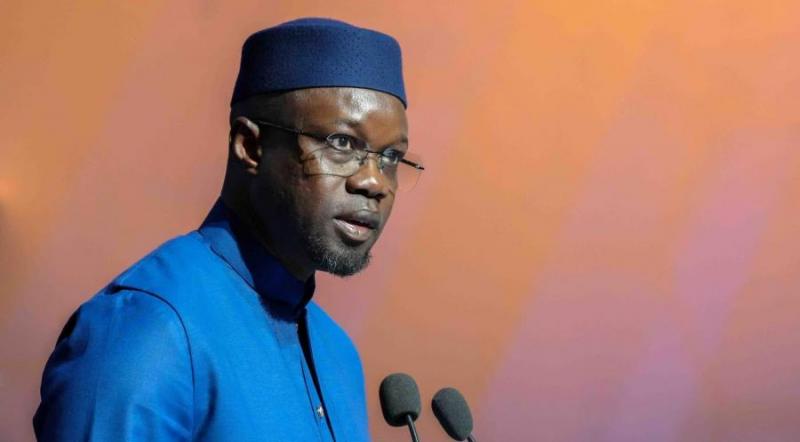Gambiaj.com – (DAKAR, Senegal) – Senegal’s political landscape was jolted Thursday evening as Prime Minister Ousmane Sonko launched his most direct and blistering criticism yet of President Bassirou Diomaye Faye, his long-time political ally and partner in Pastef, the party that swept to power just over a year ago.
In a fiery speech during the installation of Pastef’s National Council, Sonko laid bare deep tensions within the ruling coalition, publicly questioning the President’s leadership and warning of growing instability if urgent corrective action is not taken.
Though he maintained formal respect for Faye—calling him “friend” and “brother”—Sonko left no doubt about the widening gulf between them. He openly accused the President of failing to assert authority in government, allowing governance lapses and political drift to fester. His words were sharp, his frustration evident.
“Senegal has no major problem, if not a problem of authority,” Sonko declared pointedly. “If they do not know how to govern, let them let me do so.” His tone was a striking departure from the unity projected by Pastef during its ascent to power, and his message was unmistakable: he feels blocked, undermined, and increasingly sidelined.
A Fragile Tandem Unraveling
The Sonko-Faye partnership was once hailed as a symbol of political renewal. Sonko, charismatic and combative, had long been Pastef’s face, galvanizing youth and opposition supporters with his anti-establishment rhetoric.
Faye, a former tax inspector and Sonko’s close associate, was seen as the quieter, methodical administrator—a complementary figure.
But Thursday’s speech suggests the tandem is fracturing under the weight of governance. Sonko accused Faye of inaction in the face of “certain drifts,” implicitly criticizing the President’s reluctance to intervene in political crises and administrative issues.
“I went to see him. He has the power to stop what’s going on. But he hasn’t done it yet,” Sonko lamented. “If I were in his place, things would not happen like this.”
The Prime Minister further railed against what he sees as unequal treatment: while attacks against him go unanswered, he claims the presidency swiftly shields Faye from criticism. “Those who attack me are never worried. But if it is the president, instructions are given,” Sonko fumed.
Political Stakes and Personal Ambitions
Analysts see more than a clash of governance styles; they see a looming battle for power. Dr. Demba Gueye, a political analyst at Dakar’s Cheikh Anta Diop University, notes that Sonko’s outburst reflects deeper anxieties about his political future.
“Sonko fears for his political survival,” Dr. Gueye explains. “He is worried that in 2029, President Diomaye Faye will impose himself as the Pastef candidate for re-election.”
In Gueye’s view, Pastef—like many ruling parties—now faces internal fragmentation, with emerging “clans” aligning either with Faye or Sonko. The Supreme Court’s decision to revisit Sonko’s ineligibility for future elections only intensifies his vulnerability.
“Sonko knows that the signals are not green but red,” Gueye observes. “He feels politically cornered and fears being sidelined, not only from government but from the party itself.”
Cohabitation Crisis at the Top and What This Means for Senegal
What makes this rift particularly volatile is Senegal’s unique political arrangement. Unlike many countries where the President and Prime Minister hail from competing camps, here both are from Pastef—a situation that was initially seen as a guarantee of smooth coordination.
Yet Sonko’s warning Thursday—“Let me govern! Things will change because I can’t stand injustice”—highlights an increasingly dysfunctional executive partnership. His insistence that he won’t resign but would accept dismissal signals that he is daring the President to either fire him or cede him more power.
In a veiled threat to Pastef’s survival in government, Sonko warned, “Order must reign in this country. Otherwise, with what is happening, we will not last in power.”
Sonko’s public attack on Faye represents more than just internal bickering; it signals an escalating power struggle that could weaken Senegal’s fragile ruling coalition at a critical time. The country faces mounting economic pressures and high social expectations after Pastef’s historic rise to power.
The clash also marks a critical turning point for Pastef itself. Sonko, with his populist appeal, is clearly attempting to reclaim control of the party’s direction, positioning himself as the resolute, action-oriented leader in contrast to Faye’s more cautious presidency.
Yet this gamble carries high risks. It could trigger deeper internal ruptures, weaken Pastef’s ability to govern effectively, and fuel opposition narratives of chaos and incompetence.
With nearly four years left before the next presidential election, Senegal now faces an unsettling question: can the Sonko-Faye alliance survive its own contradictions—or is the countdown to political realignment already underway?










